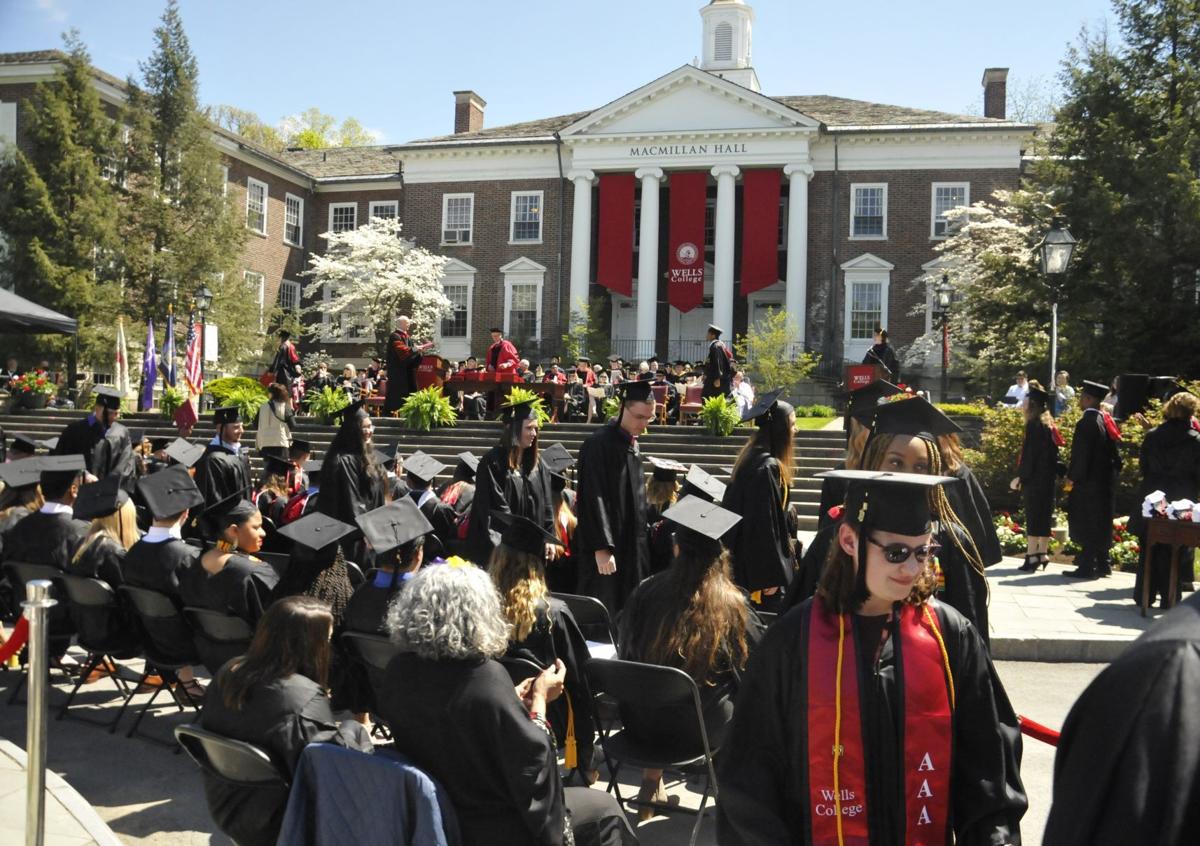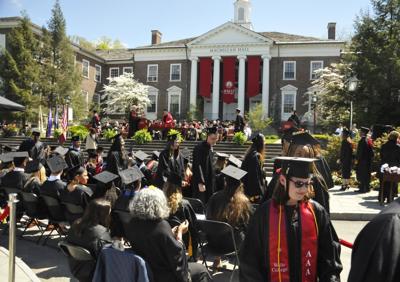Wells College has been placed on probation by its accreditation organization and given two years to come into compliance.
The Aurora-based private college was told it received the designation from the Middle States Commission on Higher Education on June 28, according to a on the college's website from President Jonathan Gibralter and board of trustees Chair Carrie Bolton. The commission said the college is not in compliance with its "Planning, Resources, and Institutional Improvement" standard and also with its standard related to financial documentation, funding sources and financial development.
Wells will have two years to completely comply with the requirements needed for its academic accreditation to be renewed, the statement said. It is also directed to submit a progress report by Dec. 1.
People are also reading…
Middle States is recognized by the U.S. Secretary of Education to conduct accreditation activities for higher education institutions in Delaware, the District of Columbia, Maryland, New Jersey, New York, Pennsylvania, Puerto Rico and the U.S. Virgin Islands, according to .
Wells is still fully accredited while it is on probation.
"The College is also modifying its budget for the coming year to bring annual expenditures closer in line with projected revenue, and also to more closely align budget allocations with our long-term strategic priorities," the statement said.
Gilbralter said in an interview with ĐÂĽÓƶŕ¶ŕżŞ˝±ĽÇÂĽ on Wednesday that as an alternative to layoffs, the college has enacted salary reductions for current full-time employees, starting with the colleges's new fiscal year, which began this month. Depending on how high an employee's salary is, that cut ranges from 3% to 6%, Gilbralter said. A 10% reduction is in effect for senior administrative staff, including himself, he said.Â
"We felt really horrible about having to do this to people who work hard and love the college," Gilbralter said. "They work hard, they care, and we wanted to make sure that we did was even more substantial than what we were asking them to do."Â
Gilbralter said the college hopes the reductions will only be in effect for one year. He said Wells has already met its goal of reducing around $1 million from the school's 2019-20 operating budget. Cost-saving measures in addition to the salary reductions include not filling vacant faculty and staff positions, he said.
Wells also has an retirement incentive program for faculty and staff who have more than 10 years of service and are 60 years old or older, Gilbralter said. The incentive is that for every year of employment, they would receive one week's salary, up to 26 weeks, he said.
In the fiscal year ending June 30, 2017, the college reported a net loss of $1.05 million, according to the most recent public filing with the Internal Revenue Service. Revenues for that year fell from $40.8 million to $34.4 million.''
The state Education Department has posted enrollment data for Wells that showed the full-time student population dropped from 558 in 2015-16 to 509 in 2016-17 and then to 481 in 2017-18. Numbers from 2018-19 have not been posted yet.
When addressing the potential challenge probation could mean for recruitment, Gilbralter said he believes colleges throughout the Northeast have had issues recruiting.
"It's a challenge, but students who want an education, want to come to a private college, really find Wells to be the right setting for them. We will continue to recruit those students. I don't think that this is going to be an obstacle for us," Gilbralter said.Â
He said the college's goal is to bring in 180 first-year students by August 2020 and it's looking to "dramatically increase" its international enrollment. The college is also open to "creative partnerships" with community colleges within the state, he said. Gilbralter said the college's new vice president for enrollment services, Gerard Turbide, who started earlier this month, is a "national expert in enrollment management, recruitment."
According to a "frequently asked questions" page on its website, Wells will have to submit a "teach-out plan" which is meant to prepare a institution "to ensure that its students can complete their studies elsewhere should the commission ultimately withdraw its accreditation," regardless of the likelihood that the plan would need to be put into action, the page said.
Despite that, the college emphasized that it is not closing.
"This is not a line of discussion that the board of trustees, the president or the senior leadership are currently evaluating — or have even seriously considered," the FAQ section said. "We strongly believe that the College will ultimately prevail over these short-term obstacles, and are looking into any and all avenues that will lead to the College continuing to fulfill its educational mission."
Wells' history reaches back over 150 years. The institution was a women's college for over 130 years before going coed in 2005. Gilbralter said he believes the college, which employs nearly 200 people in full-time and part-time positions, "will be OK" in the long run.Â
"Wells has had financial difficulties many times over the years and we've always prevailed and we will now," he said.
Staff writer Kelly Rocheleau can be reached at (315) 282-2243 or kelly.rocheleau@lee.net. Follow him on Twitter @KellyRocheleau.















